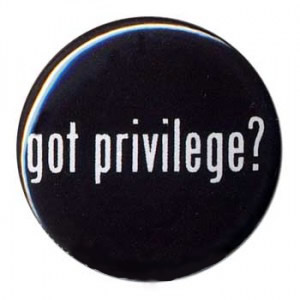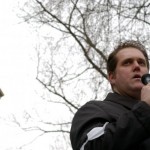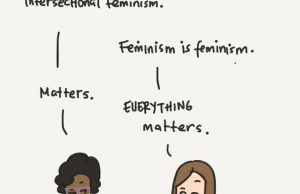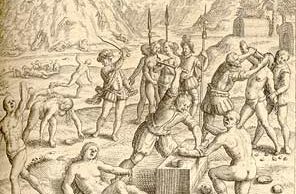In Conversation: On Race and Racism, Progression and Stagnation
By Timothy Patrick McCarthy and Darnell L. Moore
This is a second conversation in a dialogue series initially published here at The Feminist Wire.
 Timothy Patrick McCarthy (TPM): We’ve both had some unpleasant encounters recently with white critics, who have derisively called you a “blacktivist,” who have called me “self-hating” and “irresponsible.” In a moment of exasperation a few weeks ago, I texted you the question: “how do you deal with white people?” Well?
Timothy Patrick McCarthy (TPM): We’ve both had some unpleasant encounters recently with white critics, who have derisively called you a “blacktivist,” who have called me “self-hating” and “irresponsible.” In a moment of exasperation a few weeks ago, I texted you the question: “how do you deal with white people?” Well?
Darnell L. Moore (DLM): My hope is that my forms of engagement don’t come across as me having to “deal with” anyone, including white people. I do try to be honest regarding the ways I’ve come to think about whiteness, white privilege and white racial supremacy. I try my best to not lie and tell the truth about the ugliness of anti-blackness when it shows up—even among black and brown folk. And it is really easy to confuse one’s hatred for a system of destructive race-thought and structural racism, which has historically benefited white people and their pockets globally, for one’s hatred of white people. Some allege that critique of whiteness—in a society organized around anti-blackness—is really directed disdain against individual white folk or groups of white people. In some cases, that might be true; however, it is also true that one can call out a system of racial supremacy that some people benefit from and still see humanity in those people even if racial supremacy seeks to diminish the humanity of others. But it is dangerous for some white folk to acknowledge that there is truth in one’s critique about white racial supremacy because it means they will then need to question their complicity in a system that grants them power. We don’t like critique of the very mechanisms that feed us power. How do you navigate self-reflexivity and communal transformation as a white gay male in a system that privileges some aspects of your identity?
TPM: I think the struggle for me is that I’d love to be able to separate what I look like (my white-skinned, male-gendered, gay-oriented body) from what that means in a racist, sexist, homo- and trans-hating world. Not because I’m looking for an easy way out, quite the contrary. I want this for every human being. As you well know, our color (and sex and gender and sexuality) continues to shape our destiny. Though this has different outcomes for different kinds of people, it results in collective ruin, a kind of dehumanization that is both unjust and unsustainable. Put another way, insofar as race is concerned, I’d like to separate the content of our character from the color of our skin. I know full well that this is a distant dream, a long-term struggle, one that requires us to dismantle the world as it currently exists before we can remake it in some other form. That said, I hope I live long enough to see a world where “whiteness” is neither an object of desire nor something to defend, where “white people” are simply those desperate outliers who refuse to interrogate and reject the unearned power and privilege they’ve inherited from the long, shameful history of white supremacy. But we’re certainly not there yet. W. E. B. Du Bois famously voiced the question: “How does it feel to be a problem?” Of course, he was calling attention to the ways in which the practitioners and perpetrators of white supremacy mark black people as a “problem.” But I think white people need to ask themselves a version of the same question: what does it feel like to be a problem? White people will always be a problem so long as they remain ignorant to history, so long as white supremacy remains the system by which all of our lives and destinies are structured.
Speaking of which, the news cycle earlier this summer was dominated by white supremacists losing their shit and standing their ground—L.A. Clippers owner Donald Sterling, Nevada rancher Cliven Bundy, New Hampshire police chief Robert Copeland, who has refused to apologize for calling President Obama the “n-word.” What do you make of these folks?
DLM: This is no post-racial country. As a black person in the U.S., I am not now or ever surprised by bigoted statements made by white racists or by off-color comments made by white folk who claim to be liberal. That I am not surprised about or convinced that the hurtful and hateful words that some white folk utter, unaware that there is a listening public or not, is the problem. America has long been “sick” and does not want to be well. America would rather kill off its healers than to take dosages of the type of medicinal truths that can save it from falling further into the abyss of spiritual death. Racism is a symptom of slow moral death. We’ve been dying since we built this country on the backs of my ancestors.
TPM: Absolutely. I guess I’m wondering how to handle these “Big Bigots”? On the one hand, I think we should just ignore them, not give them any more “air time.” To me, their grotesque racism is like “click bait” for our outrage, especially in a social media world. On the other hand, I feel like we need to make a gigantic example of them. But I wonder if the latter approach doesn’t have the unintended effect of giving these folks more power, while allowing more routine forms of racism to persist outside the gaze of public opinion and reaction. What do you think?
DLM: All good points you raise. Silence can sometimes signal complicity or just straight-up fatigue. As someone who is affected by anti-blackness and is often responding to racial antagonism, I am often psychically exhausted. I am expected to manage the stings of white racial supremacy and combat it at the same time. I would like to see more white anti-racist advocates I am connected to, speak up, if they can. I am tired of having to explain, for the millionth time, why certain words, actions, et cetera are hurtful, inhumane, wrong. Enough. And “Big Bigots” get attention, but “Little Bigots” are most problematic.
TPM: I will try to do my part. Let’s switch gears a bit. May 17, 2014, marked the 10th anniversary of “marriage equality” in Massachusetts, and the 60th anniversary of the Brown vs. Board of Education ruling, both landmarks in the long struggle for freedom and equality. Elsewhere, we have talked about the problem of “single-variable politics.” We’re witnessing a great deal of progress on “marriage equality,” but we’ve also read a recent study from UCLA about the “re-segregation” of American schools. How do we talk about “progress,” from a civil rights perspective, given the realities of oppression and inequality that still exist all around us?
DLM: When we no longer conflate communities’ specific struggles for liberation under some universal tag of “progress” we will have moved forward. We exist in a moment where it is much easier to “march in the parade” that is solely organized around the issue that touches our individual lives. Rarely, though, do we ready ourselves to walk (if you can) alongside others in their freedom struggles. Collective struggle and progress is hampered by movements that are organized around a “good,” that is, a particular notion of liberation that is often commodified. The marriage equality movement is a perfect example of what happens when one set of aims is valued over some others, when certain demographics are also seen as befitting of our resources as opposed to some others. The individualization of progress is deadly: it does not allow for us to feel empathically for other communities; it is anti-coalition; it allows movements to be splintered and resources to be divided. So, the day when Pride Parades around the country will be organized around the need for anti-racist policies and practices or the NAACP hosts a national conversation on sexual diversity, for example, is the day when I will proclaim progress. I long for the day when the mainstream gay establishment will raise its voice (and money) whenever white racial supremacy, xenophobia, sexism, and rape culture is evident.
TPM: Speaking of progress, former University of Missouri football star Michael Sam recently became the first openly gay player drafted by the NFL. The reactions were swift, and all over the place. Some people compared him to Jackie Robinson and other sports trailblazers. Some critiqued the fact that he kissed his boyfriend—his white boyfriend—on national television. Some, yourself included, saw the occasion as an opportunity to talk about the complexity of interracial relationships in the LGBT community and the dearth of public representations of black men loving black men. While I fully acknowledge these things too, I had a somewhat different reaction in the moment. As a former college athlete, I was moved by Michael’s courage to “come out” in a hyper-masculine environment that is both homophobic and sexist. I never had that courage. Also, as a white man who is married to a black man, I also appreciated the fact that an interracial relationship—still taboo in many corners of our culture—was visible on such a large stage. This too felt courageous to me. Now I’ll admit that within gay culture, interracial love—and sex—too often involves the fetishizing of black sexual prowess as well as white social privilege. But I don’t think this always has to be the case. In other words, is it possible to just love another person, regardless of how our culture shapes and limits sexual and racial desire? Is interracial love always a form of fetish or betrayal? I’m not sure how to answer these questions, but my fear is that if the answer to the first question is “no,” and the answer to the second question is “yes,” then genuine interracial love—gay, straight, or otherwise—becomes not only impossible but unacceptable.
DLM: I am proud of Michael Sam. I am proud of all of the professional athletes, men and women, cisgender and transgender, who have made history by inviting us into their lives. And most of these sheroes and heroes are black. I think that it is worth considering, especially among those LGBTQI people (pre- and post-Prop 8) who think black people are somehow more heterosexist. But I digress. I have to admit, I knew that the images and videos of Michael Sam embracing and kissing his white partner would provoke people. I would be lying if I didn’t acknowledge my reaction. I had a “damn, here we go again moment.” I talked to black queer folk who experienced the same. On one hand, I feel like it is retrogressive to imagine love and intimacy and sexual connection as only ever happening between persons of the same race. On the other hand, it is important that we honestly acknowledge the extent to which our imaginations, and possibly our attractions, are shaped by white racial supremacy. I honor love in whatever manifestation it takes, but I am also aware of the various reasons some black gay men seek out white men. And when it is done as a means to example one’s ascent in class status, or because internalized racism has us seeing other black men as deficits, disease carriers, and good-for-nothings, or because white men are conceived as being somehow more faithful and family oriented, then I think it is important to name the problem. I am also adamant about us visioning and building a world free from the structure of race and racism. That’s my utopian dream. I support and honor those who love regardless of race. And don’t think that interracial love among all is a sign of self-hatred.
TPM: Let’s move from the intimate to the international. In the last month, we’ve witnessed another brutal war in Gaza, where there’s been a clear asymmetry of military power and a catastrophic asymmetry in terms of death toll, resulting in the death of thousands of people, mostly Palestinian civilians. Everyone knows that Gaza is one of the most densely populated, heavily policed, and disproportionately impoverished places on earth: nearly 1.8 million Palestinians, half of them children, living in an Israeli-occupied territory three miles wide and twenty miles long. Human rights organizations characterize Gaza as an “open-air prison.” The images of death and destruction have been heartbreaking, and yet it’s hard to know exactly what to do from so far away.
Now, you and I share a particular set of views on these issues, informed, in part, by our joint participation in the first-ever U.S. LGBTQ delegation to Palestine/Israel in January 2012. We both witnessed firsthand the ongoing discrimination, devastation, and dehumanization of the Palestinian people as a result of Israel’s illegal military occupation and settlement of Palestinian territories. We have seen the ubiquitous militarization, the aggressive technologies of policing and surveillance, and the oppressive apartheid laws that exist in clear view for anyone who is willing to see it. You yourself were a victim of all this when you were detained upon arriving in Israel, an experience you wrote about quite eloquently. Given all of this, we have both tried to speak out in various ways that might be useful, not only to Palestinian liberation but also to building a future based on mutual understanding and peaceful co-existence between Israelis and Palestinians. Given the vitriol and acrimony that so often accompanies this work, what motivates you to carry on?
DLM: When I choose to be silent in the face of subjugation, I, too, am part of the problem. It’s that simple to me. I am grateful for having spent time in the West Bank, but I hope that I can possess the type of consciousness, and heart, which moves me to be in solidarity with those who are exploited, oppressed, and even killed by the neocolonial state and its various structures even without having witnessed atrocity first-hand.
TPM: The war in Gaza has inspired a seemingly endless string of emotionally charged and sometimes rhetorically violent tirades from every side. Many of us have had friendships altered by this. I know I have. And yet, you and I are both “public intellectuals”—writers, speakers, teachers, activists—in an age dominated by social media, where everything is public. We’re also both Gen X’ers who sometimes grow weary—and wary—of the personal and political dynamics that operate within a culture that is often careless, reactionary, anti-intellectual, ad hominem. We often talk about the need for “self-care,” the need to gird ourselves for the coming battles. Do you think it’s possible to survive—much less flourish—in a culture where people are critiqued and caricatured every second of the day?
DLM: We live in a voyeuristic culture where surveillance and prying has many of us believing that we “know” others. We exist as one-dimensional avatars in cyberspace and as complex human beings when the computers go off. And it can be difficult to build and sustain relationships when we must constantly negotiate self-representation. I love social media despite the energies that tend to drain and impact me, however. I’ve developed some amazing friendships with folk I’ve only ever interacted with online. I learn new things every day. I’ve been connected to opportunities and resources. And I have also been subjected to berating and other forms of attack. But such is life. I am now better at curating positive online communities, though. And you know I am so wary of naming myself a “public intellectual” because I no longer understand what it means given that it is used in ways that move it away from the Gramscian idea that I initially maintained. I even hate donning “activist” as a label. Self-representation is so deeply connected to and shaped by the market-based society we live in. We know ourselves and are known through the ways we brand ourselves. I’ve tended to title myself so that I could be legible and, therefore, marketable. I am no longer comfortable doing that. I would rather do labor that produces social change. I don’t need a title to do that work.
_________________________________________
 Timothy Patrick McCarthy is Lecturer on History and Literature, Adjunct Lecturer in Public Policy, and Director of the Sexuality, Gender, and Human Rights Program at the Carr Center for Human Rights Policy. An award-winning scholar, teacher, and public servant, Dr. McCarthy received his A.B. with honors from Harvard College, and his M.A., M.Phil., and Ph.D. from Columbia University. A historian of politics and social movements, he has published four books, The Radical Reader: A Documentary History of the American Radical Tradition (New Press, 2003),Prophets of Protest: Reconsidering the History of American Abolitionism (New Press, 2006),Protest Nation: Words That Inspired a Century of American Radicalism (New Press, 2010), and The Indispensable Zinn: The Essential Writings of the “People’s Historian (New Press, 2012).
Timothy Patrick McCarthy is Lecturer on History and Literature, Adjunct Lecturer in Public Policy, and Director of the Sexuality, Gender, and Human Rights Program at the Carr Center for Human Rights Policy. An award-winning scholar, teacher, and public servant, Dr. McCarthy received his A.B. with honors from Harvard College, and his M.A., M.Phil., and Ph.D. from Columbia University. A historian of politics and social movements, he has published four books, The Radical Reader: A Documentary History of the American Radical Tradition (New Press, 2003),Prophets of Protest: Reconsidering the History of American Abolitionism (New Press, 2006),Protest Nation: Words That Inspired a Century of American Radicalism (New Press, 2010), and The Indispensable Zinn: The Essential Writings of the “People’s Historian (New Press, 2012).




0 comments